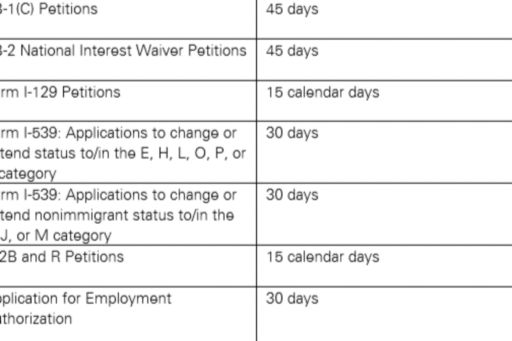United States – Expansion of Premium Processing, Extension of Certain Immigration Programs
US–Premium Processing Expanded, Immig Programs Extended
New legislation imposes certain fee increases and requires U.S. Citizenship and Immigration Services (USCIS) to permanently expand premium processing service to include many immigration applications and petitions previously ineligible for expedited adjudication. The legislation also extends E-Verify, the EB-5 Regional Center program, and other expiring programs through to December 11, 2020.

Legislation signed by U.S. President Donald Trump on September 30, 2020, imposes certain fee increases and expands premium processing to address the budgetary shortfall of U.S. Citizenship and Immigration Services (USCIS).1 The legislation also extends E-Verify, the EB-5 Regional Center program, and other expiring programs through to December 11, 2020. Although the new law took effect immediately, it could take several weeks or even months for USCIS to apply the changes.
By bolstering USCIS’ funding, the new legislation alleviates the need for the agency to furlough 70 percent of its workforce. USCIS previously stated that a mass furlough was inevitable unless additional funding was secured. (For more information about USCIS’ planned furlough, see GMS Flash Alert 2020-376, August 28, 2020.)
WHY THIS MATTERS
Historically, premium processing has been limited to certain employment-based petitions, specifically Forms I-129 and I-140. The legislation signed on September 30, 2020, requires USCIS to permanently expand premium processing service to include many immigration applications and petitions previously ineligible for expedited adjudication, including applications for employment authorization, dependent applications, and applications to change or extend status.
Given that many applicants and beneficiaries must wait several months to receive immigration benefits through standard processing, the expansion of the premium processing program will have a tremendous positive impact. More specifically, individuals will be better able to maintain continuous status in the U.S. and avoid gaps in work authorization.
More Details
The new legislation, known as H.R. 8337: Continuing Appropriations Act, 2021 and Other Extensions Act, temporarily funds the U.S. government until December 11, 2020, thus granting Congress more time to establish the budget for FY2021.
The law requires the Department of Homeland Security (DHS) to report to Congress on a semi-annual basis on a 5-year plan which will include electronic filing procedures for all applications and petitions, electronic fee payment, electronic issuance of all correspondence and notices, and decreased processing times for all immigration and naturalization benefit requests.
The legislation also provides that USCIS must not allow an “increase in processing times for immigration benefit requests not designated for premium processing.”
Summary of the Historical and New Premium Processing Programs
Prior to New Legislation2
Application Types Eligible for Premium Processing: (1) Nonimmigrant petitions in the E-1, E-2, H-1B, H-2B, H-3, L-1A, L-1B, LZ (company blanket), O-1, O-2, P-1, P-2, P-3, Q-1, R-1, TN-1, and TN-2 categories; and (2) Immigrant petitions in the EB-1(A), EB-1(C), EB-2 non-national interest waiver, and EB-3 preference categories.
Processing Times and Fees: Prior to H.R. 8337, USCIS guaranteed action on a case filed for premium processing within 15 calendar days of receipt. The premium processing fee applied to all eligible petitions was $1,440.
New Legislation
Application Types Eligible for Premium Processing: Under the new legislation, premium processing will be available for more employment-based nonimmigrant petitions, as well as dependent, change of status, extension of status, and employment authorization applications. Premium processing will also be extended to multinational managers and executives in the EB-1(C) preference category and those seeking EB-2 classification pursuant to a national interest waiver.

KPMG NOTE
KPMG Law LLP in Canada will continue to keep readers updated of GMS Flash Alert posted on any important developments as and when they occur.
FOOTNOTES
1 For the text and status of the legislation, click here.
2 For information on USCIS’ current premium processing program, click here.
VIEW ALL
* Please note that KPMG LLP (U.S.) does not provide any immigration or labor law services. However, KPMG Law LLP in Canada can assist clients with U.S. immigration and labor matters.
The information contained in this newsletter was submitted by the KPMG International member firm in Canada.
SUBSCRIBE
To subscribe to GMS Flash Alert, fill out the subscription form.
© 2024 KPMG LLP, a Canada limited liability partnership and a member firm of the KPMG network of independent member firms affiliated with KPMG International, a Swiss entity. All rights reserved.
KPMG International Cooperative (“KPMG International”) is a Swiss entity. Member firms of the KPMG network of independent firms are affiliated with KPMG International. KPMG International provides no client services. No member firm has any authority to obligate or bind KPMG International or any other member firm vis-à-vis third parties, nor does KPMG International have any such authority to obligate or bind any member firm.
GMS Flash Alert is a Global Mobility Services publication of the KPMG LLP Washington National Tax practice. The KPMG name and logo are trademarks used under license by the independent member firms of the KPMG global organization. KPMG International Limited is a private English company limited by guarantee and does not provide services to clients. No member firm has any authority to obligate or bind KPMG International or any other member firm vis-à-vis third parties, nor does KPMG International have any such authority to obligate or bind any member firm. The information contained herein is of a general nature and is not intended to address the circumstances of any particular individual or entity. Although we endeavor to provide accurate and timely information, there can be no guarantee that such information is accurate as of the date it is received or that it will continue to be accurate in the future. No one should act on such information without appropriate professional advice after a thorough examination of the particular situation.
